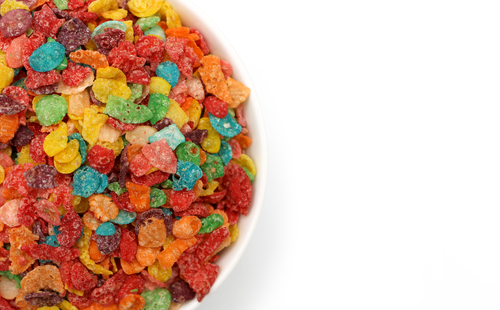Short answer
Fruity Pebbles, while not the unhealthiest cereal choice, fall significantly short of a nutritious start to the day. High in sugars and lacking in fiber and protein, it's more of a sweet treat than a healthy breakfast option.
Recommended Alternative
Long answer
The name "Fruity Pebbles" might conjure up images of colorful, fun breakfast times. And yes, these colorful puffs of rice do make breakfast more vibrant. But when it comes to your health, the picture is not quite as bright. Let's explore this popular cereal's nutritional landscape.
Fruity Pebbles is a sweetened rice cereal product from Post Consumer Brands. Its key ingredients are rice, sugar, and a medley of artificial flavors and colors. From a nutritional standpoint, a single serving (approximately 3/4 cup) contains about 110 calories, 1 gram of fiber, 1 gram of protein, and 9 grams of sugar. That's a lot of sugar for such a small portion!
Let's start with the sugar content. Consuming high amounts of added sugars, especially in the morning, can lead to energy crashes, mood swings, and an increased risk of developing conditions like obesity and type 2 diabetes. The World Health Organization recommends limiting our daily sugar intake to less than 10% of total energy intake. A single serving of Fruity Pebbles nearly uses up this allowance!
The lack of fiber and protein in Fruity Pebbles is another area of concern. Both of these nutrients are essential for a healthy start to the day as they help you feel full and keep your blood sugar levels stable. Without them, you're likely to feel hungry soon after eating.
Let's talk about the artificial colors and flavors. While they make the cereal visually appealing and tasty, they offer no nutritional value. Some studies suggest a possible link between artificial food colorings and hyperactivity in children, although this is still debated.
So, is there any good news? Yes, Fruity Pebbles are fortified with vitamins and minerals, including vitamins A, C, D, B1, B2, B6, B12, niacin, folic acid, iron, and zinc. This means they can contribute to your daily intake of these essential nutrients.
It's worth noting that fortification doesn't make a product healthy. It merely supplements an otherwise poor nutritional profile. A more nutritious choice would be a food that naturally contains these vitamins and minerals.
Overall, Fruity Pebbles sits somewhere in the middle of the health scale, leaning towards the less healthy side due to the high sugar content, lack of protein and fiber, and use of artificial flavors and colors. It's okay for occasional consumption but should not be a regular feature of a balanced diet.
FAQs:
Why are Fruity Pebbles considered unhealthy?
Fruity Pebbles are considered less healthy mainly due to their high sugar content, lack of fiber and protein, and use of artificial flavors and colors. Regular consumption of such foods can lead to obesity, type 2 diabetes, and other health problems over time.
Are Fruity Pebbles good for any meal of the day?
As a high-sugar, low-fiber, and low-protein food, Fruity Pebbles is not an ideal choice for any meal of the day. It's best enjoyed occasionally, and in moderation, as part of a balanced diet that includes nutrient-dense foods.
Are there healthier alternatives to Fruity Pebbles?
Yes, plenty! Look for cereals made from whole grains, low in sugar, and high in fiber and protein. Pair your cereal with low-fat milk or a plant-based alternative and some fresh fruit for added nutrients.
Can I make Fruity Pebbles a part of a balanced diet?
Yes, you can include Fruity Pebbles as part of a balanced diet, provided it's consumed in moderation and balanced with other nutrient-dense foods.
Are Fruity Pebbles gluten-free?
Yes, Fruity Pebbles are gluten-free, as they're made from rice. However, if you're highly sensitive to gluten, always check the label for potential cross-contamination.
Possible short-term side effects
- energy crashes
- mood swings
Possible long-term side effects
- obesity
- type 2 diabetes
Ingredients to be aware of

Benefits
- gluten-free
- fortified with vitamins and minerals
Healthier alternatives
- whole grain cereals
- low-sugar cereals
- homemade oatmeal
- fresh fruits and yogurt
Our Wellness Pick (what is this?)
Three Wishes Vegan Cereal
- High protein content
- Reduced sugar levels
- Gluten and grain-free
- Plant-based ingredients
- Non-GMO formula
 Approved by
Approved by 















